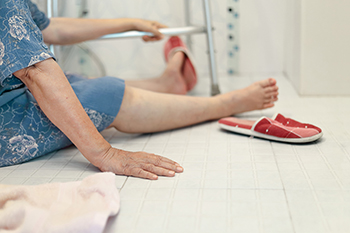
Falls are a serious concern for older adults and often begin with issues in the feet and ankles. As people age, changes such as reduced sensation from peripheral nerve damage, stiffness in the joints, or weakened muscles can increase the likelihood of tripping or losing balance. Foot pain from conditions like arthritis, bunions, or deformities in the toes may also alter walking patterns, adding to the risk of falling. Wearing shoes that lack adequate support, such as flip-flops, can worsen instability. Even small problems like corns or thick toenails may affect how securely the feet grip the ground. Untreated injuries or swelling in the ankles can further decrease stability and reaction time during movement. A podiatrist can evaluate gait, check for underlying foot conditions, and recommend supportive footwear or orthotic devices to reduce fall risk. If you are a senior experiencing instability problems, it is suggested that you make an appointment with a podiatrist for an exam and guidance on falls prevention.
Preventing falls among the elderly is very important. If you are older and have fallen or fear that you are prone to falling, consult with Richard M. Allen, DPM from Idaho. our doctor will assess your condition and provide you with quality advice and care.
Every 11 seconds, an elderly American is being treated in an emergency room for a fall related injury. Falls are the leading cause of head and hip injuries for those 65 and older. Due to decreases in strength, balance, senses, and lack of awareness, elderly persons are very susceptible to falling. Thankfully, there are a number of things older persons can do to prevent falls.
How to Prevent Falls
Some effective methods that older persons can do to prevent falls include:
- Enrolling in strength and balance exercise program to increase balance and strength
- Periodically having your sight and hearing checked
- Discuss any medications you have with a doctor to see if it increases the risk of falling
- Clearing the house of falling hazards and installing devices like grab bars and railings
- Utilizing a walker or cane
- Wearing shoes that provide good support and cushioning
- Talking to family members about falling and increasing awareness
Falling can be a traumatic and embarrassing experience for elderly persons; this can make them less willing to leave the house, and less willing to talk to someone about their fears of falling. Doing such things, however, will increase the likelihood of tripping or losing one’s balance. Knowing the causes of falling and how to prevent them is the best way to mitigate the risk of serious injury.
If you have any questions, please feel free to contact our office located in Lewiston, ID . We offer the newest diagnostic and treatment technologies for all your foot care needs.
